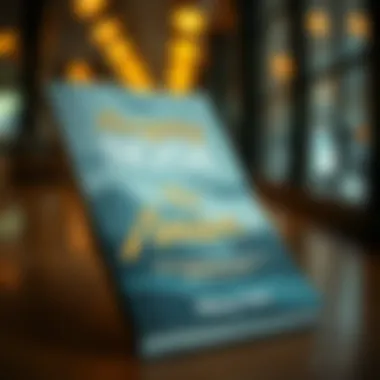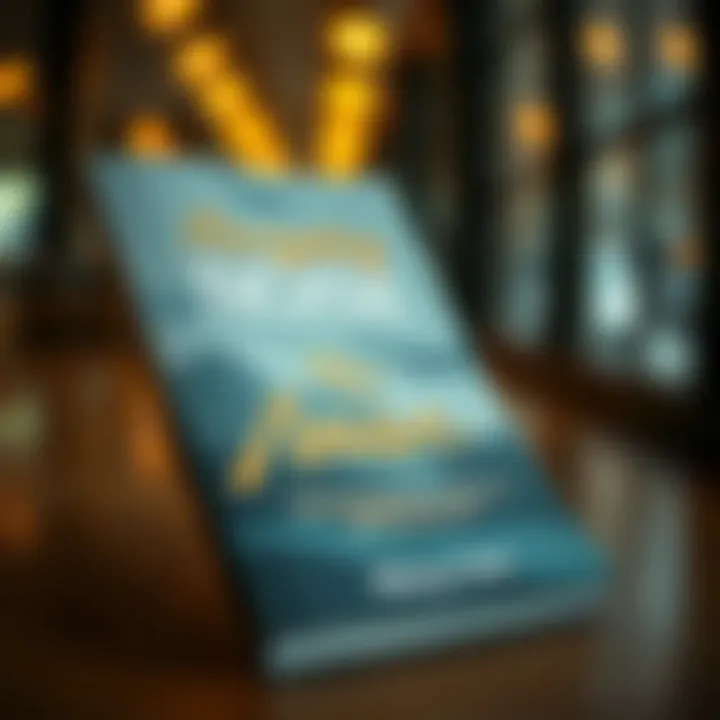Navigating the Noise: Ignoring Distractions for Growth


Intro
In an era overflowing with information and noise, the path to personal growth can often appear tangled and unclear. The ceaseless distractions we encounter daily—from the ping of a smartphone to the incessant chatter of social media—can hinder our progress and nudge us off course. To navigate through this chaos, understanding the significance of intentionally tuning out these distractions is paramount. By redirecting our focus toward intrinsic motivations and personal aspirations, we can cultivate a more fulfilling and productive life.
Distractions, while sometimes innocuous, often create a fog where clarity is obscured. This article explores the necessity of filtering out the superfluous noise around us—both external and internal. The foundation of personal and professional growth lies not just in strategic planning but in the ability to prioritize and concentrate on what truly matters. With strategies rooted in psychological insights, we will unpack the myriad of ways to enhance focus and foster meaningful engagement in our endeavors.
The journey to personal development is seldom straightforward, but by learning to navigate distractions, we lay a clearer path ahead.
Understanding the Concept of Ignoring Distractions
The ability to effectively ignore distractions is increasingly viewed as a cornerstone for personal and professional growth. In today’s fast-paced world, distractions come thick and fast, often attempting to usurp our time and mental energy. Whether it’s the incessant notifications from our smartphones or the chatter of coworkers, the modern individual faces a continual barrage of interruptions.
Ignoring these distractions does not mean shutting oneself off from the world—it’s about refining one’s focus on what genuinely matters. The increment in productivity and clarity that can be achieved by removing the clutter from the mind is not just beneficial but necessary for meaningful personal development.
Defining Distraction in Modern Life
Distraction, in the context of modern life, encompasses any stimuli that diverts attention away from essential tasks. This definition extends beyond simple interruptions such as phone calls or emails; it includes more insidious forms like the endless scroll of social media or the anxiety of constant connectivity. Most folks don’t even realize how much these distractions can affect their daily performance.
The concept of distraction has evolved over time. In the past, an individual might have been distracted by environmental noise or household chores. Today, however, the digital landscape promotes a unique form of distraction. It’s disturbing to think that a single click can lead one down a rabbit hole of videos, articles, and social commentary, all siphoning precious time and mental bandwidth.
A crucial part of understanding this is recognizing how these distractions can lead to a paradox of choice—where the overwhelming variety of options paralyzes decision-making and shifts the focus away from personal growth. Choosing to ignore these distractions isn’t merely a matter of willpower; it’s a necessary skill to nurture in an age where everything competes for attention.
The Psychological Impact of Constant Noise
Several studies have shown that constant exposure to noise, both literal and metaphorical, can inhibit cognitive function and harm emotional health. Noise can heighten stress levels, making it more challenging to concentrate and work effectively.
A notable phenomenon here is ‘attention residue,’ a term that describes the lingering distraction one feels when switching from one task to another. Research indicates that when we frequently jump from one activity to the next without a clear focus, our ability to think critically and creatively deteriorates. This residue isn’t just a momentary hiccup; it lingers in the back of our minds, clouding subsequent tasks with remnants of unresolved thoughts.
"To improve concentration, you must first filter out the noise. The quieter your environment—the clearer your mind."
Understanding the psychological cost of constant noise helps underscore the necessity of intentional distraction management. Choosing to mute the noise isn’t simply a productivity hack; it’s a fundamental practice in maintaining mental health.
Personal Growth versus Social Expectations
In a world where social expectations plague individual choices, distinguishing personal growth from external pressures is vital. Often, the loudest voices in society push individuals toward conventional definitions of success. This could manifest as a pursuit of wealth, prestige, or popularity on platforms like Instagram and Facebook.
However, the challenge is that such pursuits may not align with one’s unique aspirations or values. Ignoring these social distractions is as much about self-preservation as it is about clarity in personal objectives. When individuals reflect on their values and priorities without the noise of societal expectations, they can better chart a course that resonates with their true selves.
This discernment process is crucial for anyone seeking not just to thrive but to truly grow. It involves tuning out the clamor of expectations and zeroing in on what fosters deeper satisfaction and fulfillment. By confronting this dichotomy, individuals can embrace a more authentic and enriching path to personal growth that stands apart from the cacophony of societal noise.


The Benefits of Selective Ignorance
In an increasingly connected world, the ability to ignore distractions can transform one’s personal and professional trajectory. Selective ignorance is not simply about shutting out the noise; it's a deliberate choice to prioritize what matters most in our lives. By honing in on our intrinsic motivations and goals, we can uncover a multitude of benefits that significantly influence our daily experiences and decision-making processes.
Enhancing Focus and Clarity
One of the primary benefits of selective ignorance is the enhanced focus that comes with filtering out unnecessary noise. The human brain is like a sponge, absorbing information from every angle. However, when information overload occurs, clarity often muddles in confusion. By consciously choosing to ignore distractions—be they social media updates, unsolicited opinions, or irrelevant tasks—individuals streamline their attention towards what truly enhances their objectives.
Research indicates that sustained attention can lead to better outcomes in both academic and professional endeavors. For instance, a student zoning out during a lecture because of their phone buzzing may miss key concepts, whereas a student actively choosing to switch off notifications experiences superior comprehension and retention. In essence, this clarity brings about actionable insights and the ability to make informed decisions.
Fostering Creative Thought
Selective ignorance can also significantly bolster creative thought. By minimizing the barrage of external stimuli, one’s mind has the freedom to wander and explore. Creativity often thrives in quiet, less crowded spaces—where ideas are not drowned out by competing opinions or trends. When we quiet the outside clamor, we enable our inner voice to echo more clearly.
Take, for example, authors who isolate themselves from mainstream culture. Many of them are noted for crafting their unique narratives while detaching from prevailing trends. This is not to say that external influences are entirely disregarded; rather, they are chosen carefully. A musician jingling through sound frequencies, inspired by nature rather than background chatter of a cafe, may manifest melodies that resonate deeper and evoke true emotion because they allow their creative process to flow without interruptions.
Building Emotional Resilience
Lastly, engaging in selective ignorance helps in cultivating emotional resilience. Life is filled with challenges, and stressors are an inevitable part of the journey. By selectively ignoring negativity—be it toxic conversations, pessimistic news cycles, or unnecessary comparisons to others—we can shield ourselves from toxic influences that impair mental well-being. This selective approach nurtures a healthier mindset and promotes self-empowerment.
In practice, individuals may find that by not getting lost in the nitty-gritty of others' comments on social platforms, they can better appreciate their self-worth and concentrate on their growth.
"What you choose to engage with defines your perspective. Choose wisely, for this shapes not only your mind but your entire being."
Ultimately, harnessing the benefits of selective ignorance requires commitment and practice. It’s not so much about turning a blind eye to the world but rather about engaging with it on our own terms. Whether it’s enhancing focus, nurturing creativity, or building resilience, the roadmap of personal growth often begins with the art of discerning what demands our attention and what deserves to be left behind.
Strategies for Ignoring Distractions Effectively
In today’s fast-paced world, distractions are as common as the air we breathe. Learning to ignore these distractions is crucial for personal growth. When we can effectively manage distractions, we create a pathway to clarity, focus, and ultimately, our potential. Strategies for ignoring distractions become not just beneficial but necessary for those who aspire to reach their goals and elevate their lives. This section lays out three standout strategies: setting boundaries with technology, cultivating mindfulness practices, and creating a conducive environment for focus.
Setting Boundaries with Technology
In our tech-driven age, the constant ping of notifications from smartphones and computers can be relentless. The first step in managing this onslaught is to set clear boundaries regarding technology. You might begin with simple acts like turning off non-essential notifications during work hours. This might seem trivial, yet it can dramatically decrease interruptions. Additionally, designating specific times to check email or social media, rather than allowing these tasks to intrude on productive times, can create a disciplined rhythm in your day.
Setting boundaries with technology is akin to closing the curtains in a noisy room—suddenly, the distractions dim, and focus can take center stage.
You might consider using apps that limit your access to certain sites during work hours. Tools like Freedom or StayFocusd allow you to decide when you'll be online, helping you to reclaim lost minutes and hours. Similarly, you can turn your phone to airplane mode during pivotal tasks. Establishing these routines will not just help you ignore the distractions, but they’ll enable a deeper, more meaningful engagement with the tasks at hand.
Cultivating Mindfulness Practices
Mindfulness is an ancient practice that has found its place in modern personal development. Cultivating mindfulness can effectively quiet the noise around you while sharpening your focus on what truly matters. Practicing mindfulness could be as simple as dedicating five to ten minutes each day to meditation—focusing on your breath to cultivate a sense of presence. Not only does this help diminish distractions, but it also improves emotional regulation.


You may also explore techniques like body scanning or walking meditation. These practices promote awareness and encourage a deeper connection with your environment. When you fully immerse yourself in the present, the clatter of distractions fades into the background. The more frequently you engage in mindfulness exercises, the easier it becomes to remain grounded amidst life’s many interruptions.
Creating a Conducive Environment for Focus
The physical space around us plays a huge role in our ability to concentrate. Creating an environment conducive to focus means curating your surrounding elements intentionally. Start by decluttering your workspace. A clean surface fosters a clear mind; it's like wiping the fog off a window to let light in. Make sure your area is well-lit and comfortable, as these factors can significantly affect productivity.
Consider adding elements that promote concentration, such as plants or calming colors in your workspace. A touch of nature can bolster creativity and reduce stress, while colors like green and blue can promote tranquility. Moreover, controlling external noise can also enhance your focus. Investing in noise-canceling headphones or utilizing white noise machines may do wonders to drown out the chatter of your environment.
Finally, remember that your environment is not only about the physical space but also about the people in it. If possible, surround yourself with individuals who respect your focus efforts. Share your goals and seek out their support, fostering an atmosphere where everyone is striving for similar achievements. By establishing the right environment, you are setting yourself up to ignore distractions effectively while enhancing your potential for growth.
The Role of Literature in Cultivating Focus
In a world overflowing with distractions, literature emerges as a powerful tool that encourages individuals to cultivate focus. It serves as a refuge, allowing readers to escape the cacophony of everyday life. Engaging with literature can refine our ability to concentrate, enabling us to harness our mental faculties for deeper contemplation and personal growth. The act of diving into a book not only distracts one from external chaos but also enhances our cognitive capabilities. Through carefully crafted narratives, literature provides valuable lessons that resonate with those striving for clarity.
Learning from Influential Authors
Major literary figures have long been hailed for their ability to convey deep emotional truths and universal philosophies. Authors such as Virginia Woolf and Franz Kafka grappled with the complexities of existence, urging readers to introspect and refine their focus. For instance, Woolf’s stream-of-consciousness technique resonates with our current plight of distraction. It highlights the significance of internal reflections, nudging us to sift through noise and prioritize our thoughts. Similarly, Kafka's existential themes challenge readers to confront societal distractions that often lead us astray. Their works show that literature can lead us toward powerful self-awareness, offering a means to filter out irrelevant noise.
Furthermore, engaging with various genres can sharpen our critical faculties. Fiction often asks us to empathize with characters, fostering a deeper understanding of ourselves and our surroundings. Poetry, with its precise language and rhythm, nudges us to pay attention to the nuances in life. By absorbing these literary insights, we're more equipped to tackle distractions within our own experiences.
Extracting Key Lessons from Summaries
Summaries serve as condensed forms of larger narratives, providing an accessible gateway into literature’s wealth of wisdom. They distill intricate ideas into digestible snippets, making it easier for busy individuals to absorb valuable lessons. For instance, summarizing key themes from classic texts like Moby Dick or Pride and Prejudice can unpack essential truths about ambition, love, and societal pressures while trimming away the fluff.
By diving into book summaries, readers can identify the core messages without investing in lengthy tomes during tight schedules. This process of distilling lessons can significantly contribute to the cultivation of focus.
- Identify Core Themes: Understanding main ideas helps in prioritizing what's important in personal and professional life.
- Encourage Discussion: Summaries often lead to discussions, enhancing communication skills as they provide a framework to express ideas.
- Inspire Action: One can extract actionable insights from summaries, encouraging them to implement lessons rather than merely consume information.
Practical Applications for Busy Individuals
In a world where busyness reigns supreme, the application of strategies to ignore distractions becomes crucial for growth, both personally and professionally. The hustle and bustle of modern life often overwhelms individuals, making it easy to lose sight of what truly matters. Therefore, understanding how to effectively filter out noise can be a game-changer. Without focusing on the incessant chattering of trivial demands, busy individuals can channel their energy into more meaningful endeavors.
Integrating Insights from Literature into Daily Life
Literature offers a treasure trove of insights that can enhance personal focus. By drawing from the likes of writers such as Viktor Frankl or Maya Angelou, individuals can find reflections of their own struggles and triumphs. These stories can serve as paragons of resilience, reminding readers of the power of persistence in the face of noise.
Here are a few practical methods to weave literary insights into everyday routines:
- Daily Quotes: Start the day with a motivational quote. A simple line from a favorite book can provide clarity and direction.
- Book Discussions: Engaging with others about inspirational books can facilitate deeper thinking and help clarify personal goals. This can be as informal as a coffee catch-up or as structured as a book club.
- Story Journaling: Maintain a journal that explores how certain books resonate with personal experiences. Writing down thoughts helps reinforce lessons learned and cultivates a focused mindset.
Developing Critical Thinking Skills


Engaging effectively with distractions also hinges on one’s ability to think critically. Busy individuals often find themselves bombarded with information from all directions. Being able to sift through this data can lead to more informed decision-making and creative problem-solving.
- Ask Questions: Cultivate a habit of questioning the information received. Why is this relevant? How does this contribute to my goals? After-all, being selective about what to engage with can funnel energy into areas that truly spark joy and progress.
- Mind Mapping: A visual tool can help organize thoughts and clarify connections between ideas. Mind maps can illustrate how various distractions relate and assist in making sense of chaos.
- Set Engagement Levels: Determine how much energy to invest in different types of information. High-priority sources may merit deeper analysis, while background noise could merit cursory evaluations.
To conclude, applying these insights and strategies fosters a climate that encourages focus rather than distraction. Busy individuals can redefine engagement by carving out time amidst the frenzy to cultivate a deeper understanding of their surroundings and themselves. As productivity rises with focused action, so does the potential for growth.
A Call to Action for Continuous Learning
In a world saturated with distractions, the notion of continuous learning is paramount. This article has drawn attention to the various forms that ignoring distractions can take, yet it emphasizes the vital role that self-directed education plays in fostering personal growth and progress. Commitment to learning not only enriches an individual's knowledge base but also cultivates critical thinking and adaptability in an uncertain landscape.
Commitment to Personal Development
Committing to personal development is much like planting a seed in fertile soil—given the right conditions, it has the potential to flourish. Skilled professionals and educators often emphasize how lifelong learning opens numerous doors, positioning individuals to seize opportunities that may otherwise slip away. When you actively choose to engage in learning, whether through formal education or self-guided exploration, you create a robust framework for advancement.
In practical terms, personal development involves setting clear and achievable goals. Ask yourself what you aim to achieve—whether it's mastering a new skill, exploring a field of interest, or enhancing emotional intelligence. Also keep in mind the significance of accountability—joining study groups or accountability partners can increase commitment levels significantly!
Fostering curiosity is equally vital. Rather than fixating solely on career-oriented learning, entertain other interests that ignite passion. Break the monotony by reading books outside your field, attending workshops, or even participating in community discussions. This well-rounded approach not only amplifies your knowledge but also encourages a more profound understanding of various perspectives.
Encouraging Reflection and Self-Assessment
Reflection and self-assessment are often overlooked yet crucial steps in the learning process. By taking the time to evaluate experiences, you set the stage for more targeted and effective learning endeavors. As the saying goes, "You can’t improve what you don’t measure." Thus, integrating essays, journals, or even self-recorded videos into your routine can significantly aid in solidifying gained knowledge.
Engaging in reflective practices creates an opportunity to identify your strengths and areas needing improvement. This structured reflection can guide you in mapping out future learning paths. Envision having a roadmap crafted from both triumphant milestones and missteps alike. For instance, consider leveraging online platforms like Khan Academy or Coursera to periodically check your comprehension of various subjects.
Additionally, self-assessment fuels motivation. The simple act of tracking growth can be immensely satisfying. Metrics can range from completing a set of online courses to achieving personal bests in creative projects.
"Invest in your knowledge and you invest in your future."
In summary, a call to action for continuous learning serves as more than a mere suggestion; it becomes a philosophy that shapes personal and professional life. By committing to personal development and encouraging reflection and self-assessment, individuals are empowered to navigate the daunting noise around them. The journey of growth is inherently unique, yet it consistently rewards those willing to challenge the comfort zone and embrace a lifelong pursuit of knowledge.
End: Embracing Selective Ignorance
Engaging with the noise of our fast-paced world can feel like trying to catch smoke with your bare hands. The barrage of distractions—be it social media notifications, booming advertisements, or even the relentless buzz of modern life—can overwhelm even the most focused individuals. By recognizing the significance of selective ignorance, we can carve a path toward personal growth that is not only beneficial but necessary in today’s chaos.
Selective ignorance isn’t about burying one’s head in the sand. Rather, it’s about being intentional with what we allow to capture our attention. This practice enables us to devote energy to what truly matters, whether that’s nurturing relationships, advancing in our careers, or enhancing our overall well-being. Ignoring the irrelevant chatter frees up mental space, allowing us to cultivate clarity and insight.
Highlights of Embracing Selective Ignorance
- Fostering Focus: When we intentionally tune out distractions, our ability to concentrate improves dramatically. This focused energy can lead to higher productivity and a more profound understanding of our work or studies.
- Encouraging Authentic Connections: By minimizing the distractions that often lead to superficial interactions, we can engage more deeply with those around us. Real relationships often flourish in quieter spaces, away from the noise.
- Enhancing Decision-Making: A clear mind can lead to sound judgment. By ignoring distractions, we create an environment where thoughtful reflection can take place, ultimately improving our decision-making processes.
- Boosting Emotional Well-being: In a world that constantly demands our attention, taking a step back can improve mental health. By practicing selective ignorance, we create a buffer that protects us from the endless barrage of negativity that sometimes fills the air.
It’s crucial to view selective ignorance not as avoidance but as a thoughtful strategy to elevate our lives. In practical terms, this could mean setting boundaries with technology or engaging in mindfulness practices to sharpen focus. The oscillation between noise and silence is where growth occurs. As we learn to mute the irrelevant, we amplify our potential.
"The first step in optimizing your potential is knowing what noise to ignore."
Ultimately, embracing selective ignorance invites a more intentional approach to life. The art of tuning out distractions becomes a muscle we strengthen, nurturing our ability to engage more fully with our personal and professional goals.
For those eager to embark on this journey, it begins with recognizing the distractions around us and making conscious choices about where to invest our energy. The benefits that follow can be profound, paving the way for an enriched, more focused existence. As individuals committed to growth, let’s take that crucial step away from the noise and toward a path of clarity.



